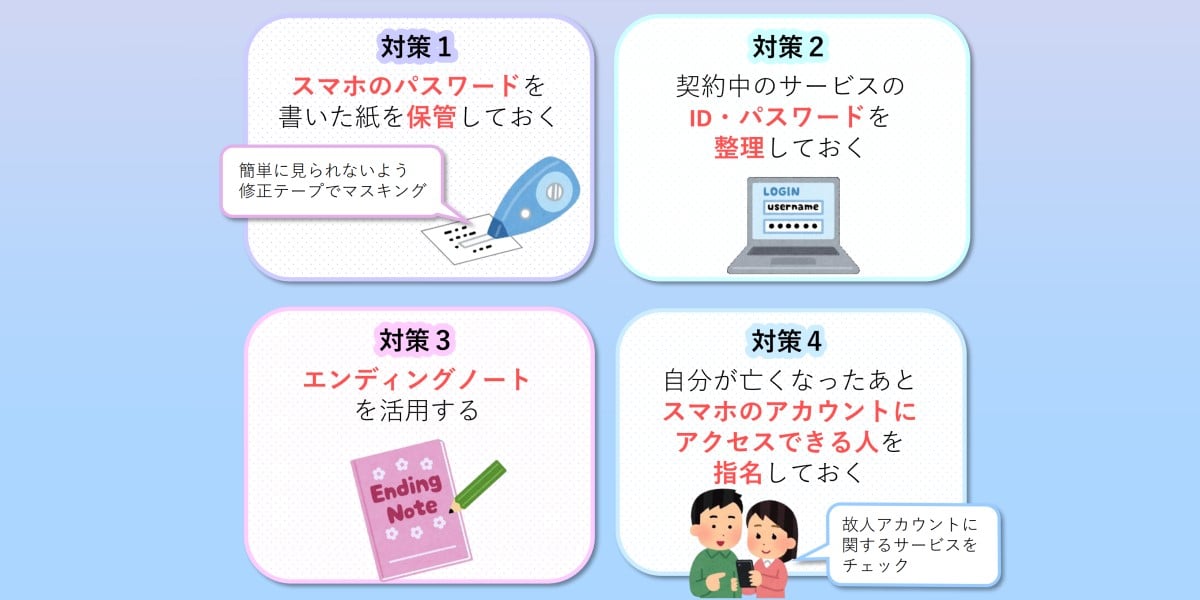- cross-posted to:
- technology
- cross-posted to:
- technology
Japan’s National Consumer Affairs Center on Wednesday suggested citizens start “digital end of life planning” and offered tips on how to do it. The Center’s somewhat maudlin advice is motivated by recent incidents in which citizens struggled to cancel subscriptions their loved ones signed up for before their demise, because they didn’t know their usernames or passwords. The resulting “digital legacy” can be unpleasant to resolve, the agency warns, so suggested four steps to simplify ensure our digital legacies aren’t complicated:
- Ensuring family members can unlock your smartphone or computer in case of emergency;
- Maintain a list of your subscriptions, user IDs and passwords;
- Consider putting those details in a document intended to be made available when your life ends;
- Use a service that allows you to designate someone to have access to your smartphone and other accounts once your time on Earth ends.
The Center suggests now is the time for it to make this suggestion because it is aware of struggles to discover and resolve ongoing expenses after death. With smartphones ubiquitous, the org fears more people will find themselves unable to resolve their loved ones’ digital affairs – and powerless to stop their credit cards being charged for services the departed cannot consume.



Password manager with a delegated access structure is the way to go. If my sister (who I have delegated to) requests access, provides a death certificate,and waits some cool-off period, she gets access to the portions of my password vault I designate. I will grant her access to my financials upon death, but not social media and private stuff.
Versus writing it down and giving it to a lawyer who probably has the same opsec as their 1920s counterpart.
Also are you going to update if every three months when you change your passwords? Writing it down gives only a false sense of legacy access that will likely never end up working
Let’s be realistic here. People ain’t changing their passwords every month, 3 months, even yearly.
Can you please let us know what password manager does what you said?
You can self host Vaultwarden, which is essentially self managed Bitwarden.
And the feature can be setup fairly easily.
Okay, but if you’re self hosting it, then die, and the hosting has an issue during that time? You’re SOL.
Don’t try to self host things like a dead man switch.
The likelihood that I die, and my loved ones decide to just turn off the server while knowing it’s where the Vaultwarden software lives, before they get access to said Vaultwarden, is very very slim.
Self host whatever you want. Even Deadman switches.
The key is informing your loved ones the requirements for the switch. Just like if they don’t know to request access in other Deadman switches.
And if the hard drive goes out?
Cmon, you can’t tell me you’re comfortable with a 2 week “anything could happen” period where all that information could just disappear forever.
I can definitely tell you I’m comfortable with that.
If family doesn’t know I’m dead in 3 days, they ain’t family.
Bitwarden has this, you can set your next-of-kin and they’ll be able to get access. (They have to wait like 2 weeks or so and I imagine all sorts of alarm bells will go off if they try this while you’re alive). Might be a premium only feature though idk.
The BitWarden Emergency Access feature is premium-only to setup. And it doesn’t have the death certificate/identity verification piece to it, which I prefer not having anyway.
Wait how does that work? I thought Bitwarden couldn’t access your passwords, how could they grant a third party access to your passwords without your master password?
my understanding is:
source